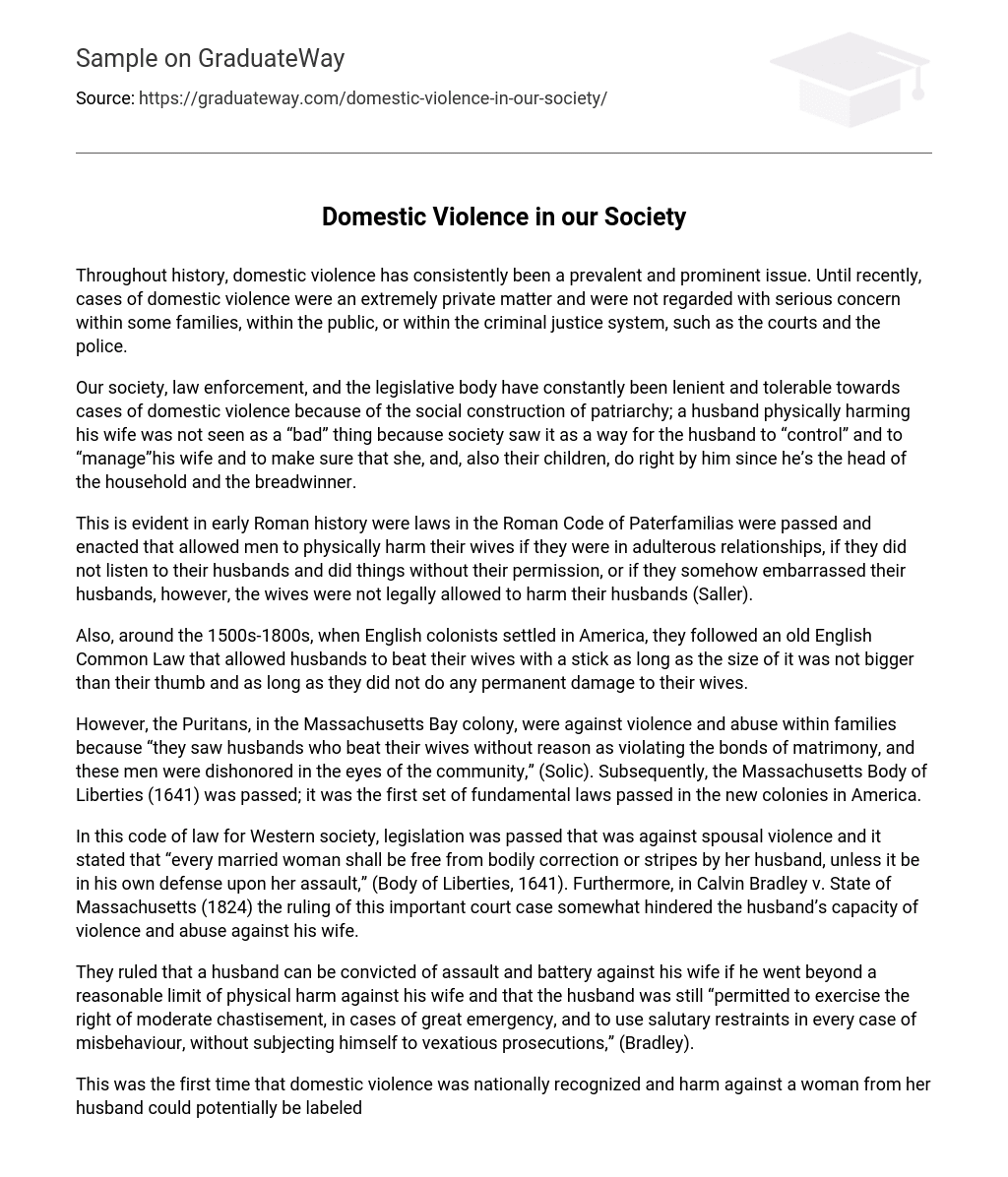Throughout history, domestic violence has consistently been a prevalent and prominent issue. Until recently, cases of domestic violence were an extremely private matter and were not regarded with serious concern within some families, within the public, or within the criminal justice system, such as the courts and the police.
Our society, law enforcement, and the legislative body have constantly been lenient and tolerable towards cases of domestic violence because of the social construction of patriarchy; a husband physically harming his wife was not seen as a “bad” thing because society saw it as a way for the husband to “control” and to “manage”his wife and to make sure that she, and, also their children, do right by him since he’s the head of the household and the breadwinner.
This is evident in early Roman history were laws in the Roman Code of Paterfamilias were passed and enacted that allowed men to physically harm their wives if they were in adulterous relationships, if they did not listen to their husbands and did things without their permission, or if they somehow embarrassed their husbands, however, the wives were not legally allowed to harm their husbands (Saller).
Also, around the 1500s-1800s, when English colonists settled in America, they followed an old English Common Law that allowed husbands to beat their wives with a stick as long as the size of it was not bigger than their thumb and as long as they did not do any permanent damage to their wives.
However, the Puritans, in the Massachusetts Bay colony, were against violence and abuse within families because “they saw husbands who beat their wives without reason as violating the bonds of matrimony, and these men were dishonored in the eyes of the community,” (Solic). Subsequently, the Massachusetts Body of Liberties (1641) was passed; it was the first set of fundamental laws passed in the new colonies in America.
In this code of law for Western society, legislation was passed that was against spousal violence and it stated that “every married woman shall be free from bodily correction or stripes by her husband, unless it be in his own defense upon her assault,” (Body of Liberties, 1641). Furthermore, in Calvin Bradley v. State of Massachusetts (1824) the ruling of this important court case somewhat hindered the husband’s capacity of violence and abuse against his wife.
They ruled that a husband can be convicted of assault and battery against his wife if he went beyond a reasonable limit of physical harm against his wife and that the husband was still “permitted to exercise the right of moderate chastisement, in cases of great emergency, and to use salutary restraints in every case of misbehaviour, without subjecting himself to vexatious prosecutions,” (Bradley).
This was the first time that domestic violence was nationally recognized and harm against a woman from her husband could potentially be labeled as a crime. Moreover, in 1871, in Fulgham v. State of Alabama, the Court ruled that men, husbands, were not legally allowed at all to use any type of physical harm on their wives.
This was a turning point in the history of domestic violence because the legislative body had finally supported the survivors and were now shifting their focus from allowing men to physically assault their wives to being able to charge and prosecute them for the harm that they caused. In the 1960s-1970s, the anti-violence movement changed the common perspective and shared attitude that everyone had about domestic violence.
This began when women began to confide in each other their stories of domestic abuse and this led to other women opening up their homes and offering their aid. Due to this, shelters, crisis centers, and support groups were formed to help women suffering from domestic violence find refuge and allowed them to have a forum to vent out their accounts of abuse.
Additionally, advocates and survivors demanded that social institutions assist them, protect them, and treat them respectfully instead of disregarding them. This resulted in significant legislative and policy changes that affected the entire judicial, legislative, and criminal justice systems. These new legal policies and procedures were the rape shield laws, the defense procedures for victims, the development of domestic violence/family courts, and mandatory arresting procedures, and Violence Against Women Act (Richie).





